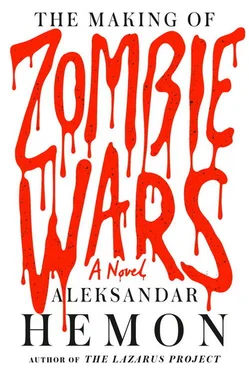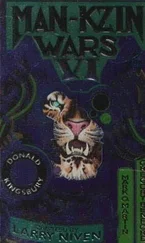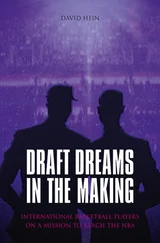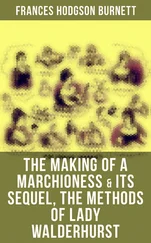Jack, still not fully recovered, had a hard time climbing the stairs in Major K’s wake. He realized he hadn’t gone up stairs in a very long time. When they reached the top of the central watchtower, he was panting and had to sit down to catch his breath on the floor glittering with glass shards. A piece of sky with a sweetbread-shaped cloud was framed, indifferent, by the broken window.
“You all right?” asked Major K. His body seemed unaffected by all the recent peregrinations. He was as strong and wiry as ever, having developed an ability to survive without food and sleep. But Jack could tell that his spirit was well eaten into, and that what used to be a will to fight was now merely an inability to quit. The body keeps doing what it does; the body outlives the soul. Major K maintained a semblance of hope only because there was nothing else left to hang their future on: not on the vaccine, which worked on Jack and himself but could not be reproduced; not on the army, which was now pretty evenly split between the killers and the zombies; not on other humans, as there had been no communication with anyone outside their group for a long time.
Picking shards out of the palms of his hands, Jack finally caught his breath and stood up. From the central tower he could see far beyond the walls. All the way to the horizon, the fields were thick and lousy with zombies stumbling aimlessly, sniffing vague traces of life in the air. They would linger outside the walls, howling and rotting through the end of time, immortal because undead. What the prison protected the people inside from was the knowledge that the world had come to an end. What it provided was a space for hope, which, feeble as it was, would still live on until every last person perished. Even zombies hoped, except they hoped for one thing and one thing alone: fodder for their endless hunger.
Major K looked down on the mass in the yard, the aggregated stench of the apocalypse rising all the way to his nostrils. He bit his lip, as if refraining from saying something that shouldn’t be said. He looked at Jack.
“Ready?” he asked.
“Give me a second,” Jack said.
“Do take your time, but there’s nothing to be afraid of.”
“Too late for that,” Jack said. “Fuck it! Let’s roll.”
Jack stepped forth to the broken window and leaned forward so he could be seen by the people below. He raised his arms and shouted, summoning every particle of energy, his voice booming in the void of the prison yard and beyond:
“People! People!”
Major K could see the mass of zombies outside shifting their random currents to turn toward Jack’s voice. The people in the yard groaned and rumbled in surprise and anticipation. Parents shushed their hungry children. Some fell on their knees.
“Last night I had a dream!” Jack lowered his voice, because now everyone listened. “A dream heartbreaking and terrible. But also beautiful.”
Major K closed his eyes and passed both of his hands over his face as if washing it. It reappeared devoid of frowns and wrinkles, stripped of despair. Even as Jack was speaking, he recognized that what had just emerged on Major K’s face was peace.
“It was a beautiful, big dream. Big enough for all of us,” Jack went on. Before he could say anything else, somewhere below, somewhere in the silent human crowd below, a cell phone rang. First once, and then it rang again. The silence between the rings was crushing.
“Pick it up!” someone cried, but nothing happened. The sea of zombies slowly funneled toward the entrance to the prison. The first wave to reach the closed gate simply stopped. They didn’t really know what to do, so they just stood there, uneasy, rumbling with hunger.
Love and gratitude to:
Etgar Keret (for the immortal cousin story);
Lana and Lilly Wachowski (for reading and laughing when needed);
Jasmila Žbanić (for letting me try my hand at comedy);
Velibor Božović (for being himself, indestructible);
Colum McCann (for friendship and loyalty and songs);
Rabih Alameddine (for finding time to read the book despite his fantasy-soccer responsibilities);
Vojislav Pejović (for being persnickety);
Catherine Peterson (for research help and the poisoned dogs story);
Duvall Osteen (for the reward of her sunny telephone voice);
Agent Aragi (for many things, but particularly for not moving a muscle in her face when I told her I’d written a book she’d known nothing about);
Sean McDonald (for patience, friendship, and appreciating the funny);
Deborah Treisman (for not allowing me to get by with lesser efforts);
Teri Boyd (for everything, but particularly for endless love and supportive giggling);
and Ella and Esther (for existing).

Velibor Božovic
Aleksandar Hemon is the author of The Question of Bruno, Nowhere Man, The Lazarus Project, Love and Obstacles , and The Book of My Lives . He has been the recipient of a Guggenheim Fellowship, a “Genius Grant” from the MacArthur Foundation, the Jan Michalski Prize for Literature, the PEN/W. G. Sebald Award, and, most recently, a 2012 USA Fellowship. He lives in Chicago. You can sign up for email updates here.













